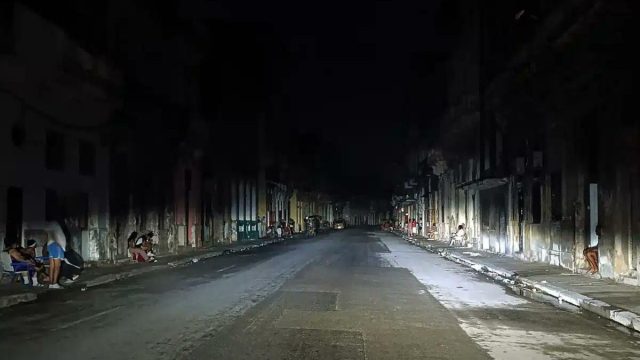Three days without electricity has been a bombshell for the Cuban people. The first signs in the island’s capital of a dark eruption forced President Miguel Díaz-Canel to issue a strong warning about the consequences of taking to the streets in the dark to protest. “Regarding the special events that have taken place in Havana, the president explained that there are ways to solve any problem, but ‘We don’t allow vandalism and to change the peace of the citizens of our people,’” the X speech of the president became known.
The unrest has been growing throughout the week, but since Friday when the first disconnection of the National Electric System (SEN) took place, social media has become a hotbed of anger. Risk of repeated incidents like what happened last March in Bayamo and a part of Santiago, two cities where the rebellion of Sergeant Fulgencio Batista began in 1953, ringing bells in the government.
The power outages are testing the patience of people facing a host of problems, from rising prices and low wages to shortages and unprecedented urban violence.
The Ministry of Energy and Mines (MINEM) of Cuba reported this Third blackout of the National Electric System (SEN) in 72 hours. The government expressed its intention to work “without rest” until the disturbances are stopped. Advances in the early hours to restore the SEN service were also disrupted. Vicente de la O Levy, who is in charge of Minem, said that the biggest Tuesday in the Antilles is expected to return to normal on Friday.
Before the first blackout, Cubans had been suffering from a prolonged blackout, although not as severe as the previous few days. De la O admitted that the situation is difficult and that the lack of light has gone away “for most Cubans” without water in their homes because the engines that pump the water in their homes use electricity.
Strong winds at the gates
Daily life has been completely disrupted. The effects of power outages are felt in technical services such as hospitals. Officials said all non-essential administrative and training activities have been suspended till Wednesday. They said that “the hurricane Oscar is about to pass through the country and it is time to restore it afterwards, as well as the work that is being done to restore the electricity of the country.” The combination of these two factors can have serious consequences.
The typhoon has already affected the eastern part of the island. The Forecast Center of the Cuban Meteorological Institute (Insmet) said that “the weather has already started to deteriorate in the provinces of Guantánamo and Holguín with rain, rain and thunderstorms.” “Strong eruptions occur on the northeast coast.” Considering the proximity of the cyclone, so far Category 1, the eastern regions have entered Cyclone Alert on Sunday morning.





